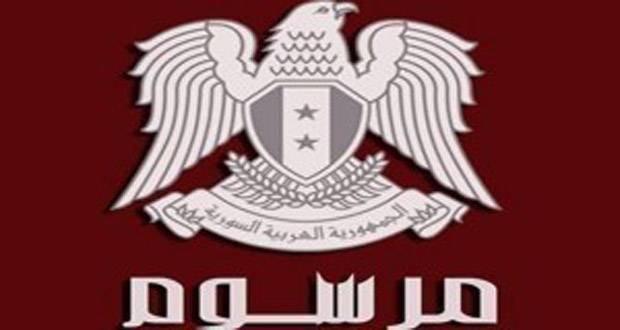Syrian President Bashar al-Assad today issued two decrees enforcing the dismissal penalties imposed by the Higher Judicial Council against two judges for committing legal violations and mistakes. According to the Syrian Arab News Agency (SANA), Decree No. 13 of 2021 stipulates the implementation of the dismissal penalty imposed by the Higher Judicial Council's Decision No. 4/4 dated 11-1-2021 against Judge Muhammad bin Ali Youssef, counselor at the First Civil Appeals Court in Jableh, Latakia, of the second rank and first degree, and the settlement of his rights in accordance with applicable laws.
The agency added that Decree No. 14 of 2021 stipulates the implementation of the dismissal penalty imposed by the Higher Judicial Council's Decision No. 1/1 dated 4-1-2021 against Judge Rakan Muhammad Wahiba, counselor at the Seventh Misdemeanor Appeals Court in Aleppo, of the first rank and third degree, and the settlement of his rights in accordance with applicable laws.
It is noteworthy that the decrees did not specify the violations or legal mistakes that led to the enforcement of the dismissal penalties against the two judges. According to Decree No. 98 of 1961, which regulates the work of the judiciary and the powers of the Ministry of Justice, four types of disciplinary penalties can be imposed on judges: reprimand, salary deduction, promotion delay, and dismissal. Article 106 of the previous decree details the four penalties. In the case of reprimand, the judge is notified by a letter containing the committed violation and advised to avoid similar infractions. The reprimand may not be recorded in the judge's record.
Salary deduction involves a reduction of an amount not exceeding ten times the judge's net monthly salary for a period of no less than one month and not more than one year. Promotion delay means depriving the judge of promotion for a period not exceeding two years, while dismissal entails terminating the judge's service and settling their rights according to the law.
Disciplinary penalties are imposed on judges by the Higher Judicial Council, and they are referred to it by a decree issued based on a proposal from the Minister of Justice or the President of the Higher Judicial Council, which is not published in the official bulletin, according to Article 107. Article 108 stipulates the referral of judges who fail to fulfill their duties or offend their personal dignity or the dignity of the judiciary, or violate laws and public regulations, to the Higher Judicial Council. The suspension of judges referred to the Higher Judicial Council is only permissible by a decision from the Council itself.
It is noteworthy that the Syrian Prime Minister, Hussein Arnous, confirmed on January 17 that the “National Anti-Corruption Strategy” has been developed with its various aspects related to enhancing the principle of the rule of law and equality before the judiciary to ensure the punishment of corrupt individuals, and reinforcing the role of oversight bodies and institutions in effective oversight of state apparatus.
Arnous clarified before the People's Assembly that ministries and various entities have undertaken a series of measures and actions aimed at combating corruption and limiting its occurrence, as well as addressing its manifestations. He added that the Ministry of Justice is working within the framework of the judicial reform program with the relevant authorities in three areas: enhancing integrity through amending laws, expediting cases in courts, and supporting judicial independence and ensuring the necessary infrastructure.
In the same context, Syrian Justice Minister Ahmed al-Sayed decided to end the assignment and transfer of a number of judges without specifying the reasons. In December 2020, the referral of a number of Court of Cassation judges to the Higher Judicial Council sparked controversy among legal circles in Syria, especially as it was accompanied by the publication of their names. According to a statement by Justice Minister Ahmed al-Sayed at the time to "Russia Today", some judges from the Court of Cassation were referred to the Higher Judicial Council “for investigation into some violations,” but there was no ruling or condemnation against any of them. The minister explained that the procedure remains confidential until the investigation is concluded, and the ministry cannot disclose their names as the results will determine whether decisions will be issued to prevent prosecution.
It is noteworthy that Judge Ahmed al-Sayed took up the position of Minister of Justice in the government formation in August 2020, succeeding former Minister Judge Hisham Shaar, and held the position of counselor at the Court of Appeals in Damascus before becoming a full-time counselor at the Court of Cassation. He was born in the city of Quneitra.




